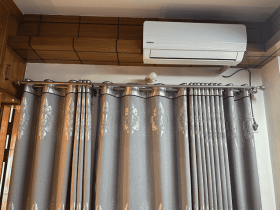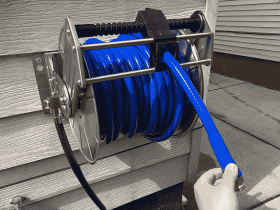Dirt buildup on various system components is linked to several of the most common air conditioner problems. A filthy air conditioner can cause a variety of efficiency and operational issues, so it’s critical for homeowners to understand how they can maintain their systems clean. Let’s look at why a dirty air conditioner is a problem and what part you may play in air conditioner cleaning!
Why is a dirty air conditioner problematic?
In order to extract heat from the air in your home and dump it outdoors, your air conditioner cycles refrigerant between an indoor unit and an outdoor unit. The evaporator and condenser coils are the two most significant components in this operation.
Heat is transferred from your home’s air to the refrigerant inside your evaporator coils (found inside) and delivered outside when air blows over them. Heat is transferred from the refrigerant inside the coils to the air outside when air blows over them (placed outside).
When dirt accumulates on either pair of coils, it obstructs the heat transfer mechanism. That implies your air conditioner’s refrigerant will have a significantly tougher time absorbing and/or releasing heat from your home. This will not only make your home less pleasant, but it will also increase the energy usage of your system.
A filthy air conditioner is prone to airflow issues and is at a far higher risk of suffering malfunctions than a clean system, in addition to generating difficulties with your coils.
The Benefits Of Cleaning Your Cooling System
Better Efficiency
Cleaning your air conditioner reduces the tension and pressure that dust and debris build-up puts on it, allowing it to run more efficiently. The regular flow of air is obstructed when air filters become clogged and unclean, causing your unit to work harder than it should. Furthermore, when dust coats your evaporator coil, it loses its ability to absorb heat, lowering its efficiency and ability to chill your home.
Lower Bills
Cooling systems account for a major amount of your monthly power consumption in a typical household. A dirty air conditioning unit, on the other hand, consumes more energy since it is forced to work harder, increasing its operational costs. In general, such air conditioners use five to ten percent more electricity than standard air conditioners. Cleaning your air conditioner reduces the need for it to work harder, saving you money on your electricity cost.
Better Air Quality
Your air conditioning unit does more than simply keep your house cool; it also helps to keep the air circulating within your house clean and healthy. Mold, fungi, bacteria, and pathogens can grow in a filthy environment. When you switch on your air conditioner, these particles are blasted into the room and contaminate the air, exposing you and your family to a range of respiratory infections and triggering asthma attacks.
Hire A Professional
Hire a professional service expert in home hvac services if your air conditioner requires more than routine maintenance. Your air conditioning system will be diagnosed and repaired by a trained technician.
The technician should be able to:
- Make sure you have the right amount of refrigerant.
- Using a leak detector, check for refrigerant leaks.
- Instead of illegally releasing any refrigerant that must be removed from the system, capture it.
- In central systems, look for and seal duct leaks.
- Airflow via the evaporator coil should be measured.
- Verify that the electric control sequence is proper and that the heating and cooling systems are not operating at the same time.
Bottom Line
There are numerous advantages to keeping your air conditioning equipment well-maintained and cleaned on a regular basis. The reasons outlined above are just a few of the many reasons why you should have a professional air conditioning installation provider inspect and clean your unit every twelve months.











Leave a Review